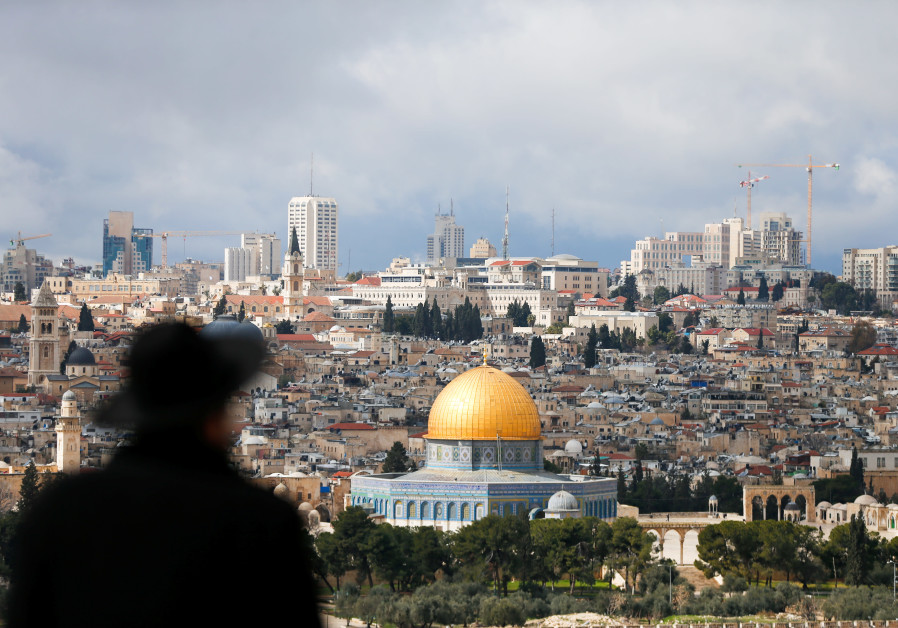Analysis: Rabbis squabbling over conversion while Jerusalem burns

An ultra-Orthodox Jewish man is seen in the foreground as the Dome of the Rock is seen in the background February 15, 2017. (photo credit: REUTERS/AMMAR AWAD)
If ever there was an example of how Jewish infighting brings about disaster, the recriminations surrounding the latest proposals for restructuring the conversion system are surely an outstanding one.
Here is a summary of the various factions’ positions on the proposal to transfer jurisdiction for conversions from the Chief Rabbinate to new state-authorized Orthodox body: the chief rabbis loathe the proposals because they remove conversion from their authority and power; the haredi political leadership agrees with that stance, adding that formal recognition of non-Orthodox conversions done abroad is unacceptable, even though such recognition is the de facto position today.
The conservative national-religious rabbis insist that conversion be kept as a state authority, even though the proposals do just that; the leading mainstream national-religious rabbis are for it, and then against it, or won’t say they support it publicly; and the liberal national-religious rabbis argue that the law gives the state an unjustified monopoly over conversion.
And while the progressive Jewish denominations in Israel initially welcomed the recommendations, they now say that they won’t enter into negotiations since the haredim are determined to bury them, arguing that they have experience with this situation in light of the Western Wall debacle.
But while the rabbis are bickering, they seem entirely oblivious to the raging inferno burning out of control under their noses.
As Moshe Nissim, the former justice minister who drafted the new recommendations pointed out, there are currently some 400,000 Israeli citizens from the former Soviet Union and their descendants who are not Jewish according to Jewish law but who are fully integrated into Israeli society.
They go to school with Jewish Israelis, serve in the army alongside them, study in university with them and will ultimately marry and have children with them – in this generation or the next.
This is the very problem the state conversion authority was established to address.
And instead of getting smaller, this group is actually growing – by some 10,000 people a year according to Nissim – due to the natural growth of the population and new immigrants arriving every year who are also not halachically Jewish.
The haredi political leadership and the community at large are widely apathetic to this problem since they do not regard converts through the state conversion authority as valid and will not marry them.
At the same time, haredi rabbis and politicians head the Chief Rabbinate and the religious establishment, and they have a vested interest in preserving the power, prestige and authority they currently enjoy.
The conservative national-religious rabbis are becoming ever more haredi in their perspective on matters of religion and state, as well as bitterly antagonistic to Reform and Conservative Judaism, while the mainstream national-religious leadership appears to be cowed by their more radical colleagues, afraid to stand up for what used to be defining principles.
There is no easy solution to what should correctly be called “the intermarriage crisis,” since non-Jewish citizens from the former Soviet Union and their children are not exactly inundating the rabbinical courts with requests to convert.
Yet even Nissim’s modest proposals to address the issue are immediately buried under an avalanche of political invective and obstructionism.
Tired of waiting for these rabbis and the state to come up with a constructive solution, a group of moderate national-religious groups banded together in 2015 to set up non-state conversion courts to try and boost the numbers of converts, specifically targeting minors (with parental permission) because they are both easier to convert under Jewish law and also not yet married.
But this initiative is also unlikely to provide a comprehensive answer to the crisis, due to the very fact that these courts are not formally recognized by the state or by the Chief Rabbinate in any manner.
The reality is, therefore, that the endless rabbinical squabbling and dallying over conversion will ultimately seal the fate of the Jewish population in the Jewish state, which now seems destined for internal, sectarian division between two distinct groups whose members will not marry each other.
Nissim presented the conversion crisis on Sunday as an existential crisis for the State of Israel. He was not exaggerating.





Comments are closed.